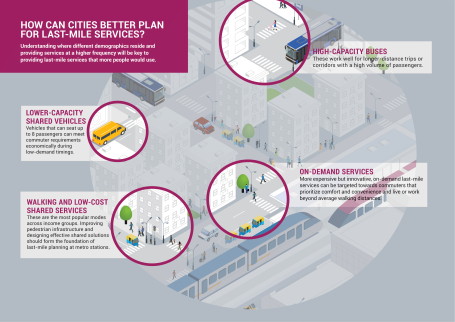
Unlocking Connectivity to Mass Transit in India
Advancing equitable and sustainable transport solutions to improve metro access in Indian cities.
India's cities are rapidly expanding their metro rail networks to combat urban congestion, transport emissions, and road fatalities. However, many metro systems remain underutilized, achieving as little as 10% of projected ridership (UITP India, 2021). One of the primary reasons is inadequate last-mile connectivity—pedestrian and cycling infrastructure is often insufficient, while motorized options like feeder buses, shared autorickshaws, and ride-hailing services can be unreliable, unsafe, or unaffordable. As a result, commuters are discouraged from using the metro.
Our research reveals key trends in last-mile commuter behavior in India:
- Demographics: Metro users tend to be between 19 and 35 years old, commuting primarily for work or education. Most come from middle-income households earning between INR 10,000 and INR 40,000 per month.
- Mode Preferences: Price-sensitive commuters favor walking or low-cost shared services. Shared autorickshaws are a particularly popular last-mile mode.
- Gender Disparities: Women face higher last-mile costs and shorter travel distances but are more averse to waiting, leading them to opt for costlier, faster services.
- Access Time: Commuters are willing to spend up to 20 minutes—including waiting time—to reach a metro station, defining the station’s effective catchment area.

Explore more insights from one of India’s largest surveys of metro commuters: Improving metro access in India: Evidence from three cities (working paper)
Improving last-mile connectivity remains an integral part of developing a better public transport network. Our approach to strengthening last-mile connectivity combines research, pilots, and partnerships to drive scalable impact. We’re making metro systems more accessible by improving infrastructure, enabling open transit data, and empowering women in mobility. From electric three-wheelers and digital journey planning tools to behavior-change strategies and inclusive design, these efforts are transforming how commuters connect to public transport across Indian cities.
Key Initiatives:
Station Access and Mobility Program (STAMP)
Launched in 2017, STAMP seeks to improve metro accessibility across Indian cities through research, innovative pilot programs, and stakeholder collaboration. Over seven editions across seven cities, STAMP has facilitated over 50,000 last-mile trips and saved more than 240,000 passenger minutes. Key interventions include electric autorickshaw services, ride-sharing platforms, and innovative policy recommendations. In Bengaluru, the STAMP: Nudging Commuter Behavior initiative is now testing behavioral science-based strategies to encourage public transport adoption along the upcoming Yellow Line Metro corridor to Electronic City.
Enroute Challenge
By enabling open and standardized public transit data Bengaluru, the Enroute Challenge is laying the foundation for more public transport use in the city. A collaboration between Mercedes-Benz Research and Development India (MBRDI), WRI India, and Villgro, Enroute supports startups like Tummoc and Namma Yatri to pilot integrated digital services—including real-time journey planning, ticketing, and ride-hailing. Backed by INR 90 lakh in seed funding, these pilots demonstrate the power of open data to transform the commuter experience and boost public transport use citywide.
Low Emission Access to Public Transport (LEAP)
The Low Emission Access to Public Transport (LEAP) program, a partnership between Alstom and WRI India, addresses last-mile challenges while empowering women in transport. LEAP deploys women-driven electric three-wheelers (e-3Ws) to improve metro access, particularly for female commuters who face unique safety and accessibility barriers. This initiative not only enhances last-mile connectivity but also increases women’s participation in the transport workforce, contributing to gender-inclusive urban mobility.
Follow one auto driver's journey through the LEAP program: Chandrakala's Journey: Empowering Women Through the LEAP Program

